13. Computer Chess

12. Blue Is the Warmest Color

The
unexpected big winner at Cannes 2013 comes with a slew of controversy
and a hodgepodge of interpretations, most notably the critique on the
'male gaze' that seems to fall upon the two magnificent leads,
especially from a thoughtful essay here.
Some say it is about homosexuality, others, like in the link, say it is
about heterosexuality. I see this film more about sexuality in general,
sexuality explored through a growing girl's experience with first love.
Adele, played brilliantly by Adele Exarchopoulos, seeks and expresses
love physically as if that is the only way she knows how. What
transpires in its epic length is the gradual shattering of a young
girl's perspective of love. This film, no matter the interpretation, is
driven by the courageous performances of the two girls who, to put it simply, depict women
in love.
11. A Band Called Death

Much in the same vein of last year's Searching For Sugarman, A Band Called Death is a fascinating story of musical revival. What makes this film so astounding is the familial narrative that creates a powerful tale of music that transcends mere entertainment and forms more of a consciousness for how the band members, all brothers, can perceive life and how memories are ultimately formed and structured. There is a profound significance in regards to this proto-punk band's name, Death, that is gradually explained throughout the duration of the film but the film and its makers make the right choice to not clearly explain it and let the viewer ponder on its magnificence. It also helps that the social actors, the brothers and their families, are infectiously insightful with lives as intriguing as the pulse-pounding beats of their rock and roll. (Note: this filmed first premiered in 2012 but it was not covered by many critics until 2013, so, yea)
10. American Hustle
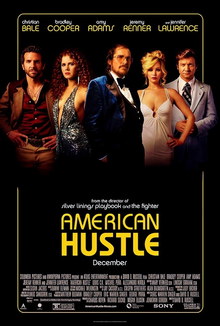
Just as the opening scene of Christian Bale's character, Irving Rosenfeld, performs an elaborate comb-over, the film is all about revealing that things are never what they appear on the surface. And when the film centers on a complex relationship between two con artists (played with charm by Amy Adams and sympathy by Bale), David O. Russell's crime film is all about the glitz and glamor as well as peering past the glitz and glamor to find vulnerable individuals. Despite a somewhat loose plot, Russell succeeds because his cast is eager to explore these vulnerabilities, especially Bradley Cooper, whose Richie Di Maso seems like an FBI agent with anxiety disorder. This can also be seen as Russell's homage to Martin Scorsese (whose infinitely scathing film did not make the list): just note a crucial cameo in the middle of the film as well as Bale's acting style and voice (his voice is very reminiscent to De Niro). American Hustle is a suave crime drama meshed with a compelling human drama to create a story as colorful as the diverse costumes worn by the characters throughout the film.
9. The World's End

8. 20 Feet From Stardom
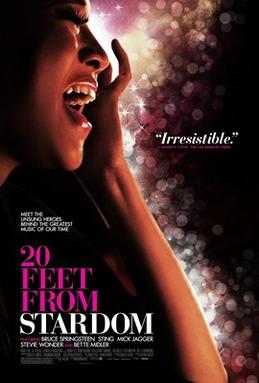
7. Fruitvale Station

6. Fill The Void

5. Gravity
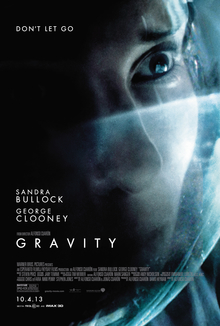
There
is almost an inexplicable perfection for a story dealing with the human
frailty expressed in an attempt to understand existence to place itself
among the stars. Nothing, even though it has seldom been experienced,
feels as vulnerable than to be flying aimlessly in space...with your
oxygen depleting. It made so much sense for Alfonso Cuaron to direct Gravity,
a film that is most certainly about the symbolic trajectory of a lone
survivor in the largest realm imaginable. He revels in the long take,
but a long take that is not static but rather fluid and exploratory
(just watch his phenomenal science fiction film, Cildren of Men).
This film places this technique at its zenith, and the engrossing
result is one filled with wonder and anxiety. Seeing this in IMAX 3D was
almost necessary as the vulnerability of Sandra Bullock's character, among the inexplicable vastness of space
became clearly translated for the viewer. The rest of the film was
beautiful to see, if not haunting. Gravity is an exhilarating
cinematic experience that not only offers a thoughtful, imaginative
story but a story that expands the possibilities of cinema, itself.
4. 12 Years a Slave
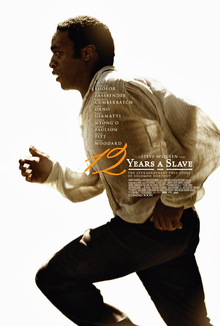
How can a film so painful be so beautiful? Director Steve McQueen seems to admonish slavery while at the same time having his cinematographer set up shots that feature a whole pallet of colors, interplay between light and shadow, and beauty of the southern landscape. The beauty is the backdrop, setting up a stark contrast to the scathing inhumanity exhibited by many of the delirious characters. Among the many great and darkly illustrious moments there was one scene that stood out: when Brad Pitt's character, Bass, arrives at Edwin Epps (Michael Fassbinder) to build a house, Solomon Northrup, played remarkably by Chiwetel Ejiofor, helps build it. As Bass and Northrup get to know each other, Northrup decides to tell Bass that he was a free man with a family in the north. As Bass looks at him, gently trying to convince him to expose any secret he may have, Ejiofor's mouth opens very slightly, trying to get words out of his mouth. His bottom lip begins to quiver incessantly and his eyes well up. This is the culmination of years of pulverization of not just a human individual but of an identity, so much so that Northrup is afraid to submerge his identity he was once proud of. The viewer witnesses this slow degradation into a man who is just continuing his existence by surviving. Some critics have claimed it to be essential cinema. I agree, and it is cinema that tests our emotional and physical strengths (as well as the cast's). Last year we had Tarantino's Django, which I called into question for its motivation. This film's motivation is without question, and Steve McQueen has risen to be one of the best new filmmakers in the world. With time, I feel this film's importance will only grow.
3. The Act of Killing

There are many moments in our lives where we are detached witnesses to atrocities in our country or around the world. We absorb them with astonishment and fall into an inescapable disillusionment, simplifying our feelings into one, commonplace question: "How could anyone do such a thing?" The Act of Killing is a remarkable film in that delves into the minds of individuals that are the subject of such a question. The film gives us a chance look upon a possible answer as it follows a couple of Indonesian gangsters as they recreate their own genocides in a film they are making inspired by the Hollywood films that attracts them. What transpires is a reflection on perceptions of violence: the change of perception as one starts as the perpetrator and eventually moves to the victim...and the emotional disconnect that is revealed. It is also a film about film; there is a constant reminder that cinema is a reproduction of reality and, thus, the emotions of the real events are reproductions within the film. The gangsters in the film have different ideas of how to approach the making of their recreation since cinema and the act of reproduction opens up a limitless amount of possibilities of how the killings should be portrayed. This is a nightmarish phantasmagoria of evils revisited, of dark and hardened memories excavated from the depths of years of built-up indifference and detachment. This is also a film about cultural mentality and how one way of thinking, which can be abhorrent to some, can be the motivation for an entire population. What can we make of these men as we watch this film. I don't think I will be able to formulate anything cohesive about my feelings and reflections for a while. One thing I do know is that the main director, Joshua Oppenheimer, embarks on a brave and paramount journey into a world molded by fear, where the term 'gangster' is interchangeable with 'free man,' and an entire modern nation looks upon its history with inconsistent eyes. The film goes in and out of fiction and nonfiction, but we can never tell where the fiction stops and starts, always leaving a sense of unease. I did not know a film like this could be made. It has been made and its a film as necessary to the human race as any that I have seen.
2. Inside Llewyn Davis
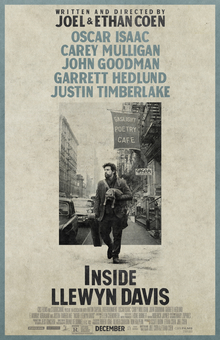
The main character, Llewyn Davis, might have just as much natural talent in getting himself in terrible situations as he does with playing guitar and singing engrossing folk music. Thus lies one of the many ironies in a film filled with ironies that weaves a remarkable tapestry of melancholy. Within their full body of work, this new Coen Bros. film falls in line with films like A Serious Man and The Big Lebowski as distinct character studies within a symbolic historical context (early 90s and Gulf War politics in Lebowski and 60s Midwest Jewish America for A Serious Man) by studying a not so sympathetic character during the early 60s on the eve of a folk revival. The Coen Bros. are at the top of their game and remain, in my mind, as the best contemporary filmmakers. They seem to bring together a crew that effortlessly creates a world so rich in authenticity and detailed in texture that every shot composed within the duration of the film is a necessary shot to not just progress the plot (well, a semblance of a plot) but to encompass the viewer more and more into the minds of the characters (hence the title). Moreover, the Coens not only seem to bring out the best in their actors but also the most unique; take note at the secondary players of the film (including Justin Timberlake, John Goodman, and Garret Hedlund) and how they all carry a certain eccentricity to their mannerisms as well as what they say and how they say it, almost turning into caricatures but not quite. Symbolism is potent in this film, which is of no surprise for a Coen film, so one must throw themselves into the film to fully capture its significance. Of course, Oscar Isaac's phenomenal performance and fist-clenching musical performances are incredible which goes without saying that T-Bone Burnett is also on top of his game and the hottest ticket in town when it comes to truly American films. What a great, intensely emotional film this is. So much so that this film and the next one can be interchangeable as my most enjoyable of the year. It only makes me anticipate more for what the Coen Bros. have next (in terms of historical trends, we might see a bigger budget film).

1. Nebraska

We
seem to glide with the main characters from Billings, Montana to
Lincoln, Nebraska in Alexander Payne's most recent film. There is a sort
of softness with the visuals, too, or maybe it's a delicacy (there is
one shot of rolling hills with numerous haystacks plotted all around
with a pile of sticks in the foreground...it's so delicately shot it
looks like we are looking at miniatures). This makes sense, because the
leading man, Bruce Dern's Woody Grant, is delicate, albeit harmfully
stubborn. Nebraska is first and foremost a road film, but a road
film with a huge care in family dynamics as well as a detailed look at
the world where the travels take place. This film is all about coming to
terms with the past and the generational significance it implies. We
see many elderly individuals and with the crisp black and white
photography we observe their aged and weathered faces...and how
beautiful they are. This film is filled with humor, sometimes so
cynically scathing, sometimes gentle. And the performances drive such a
bilateral tone, with Bruce Dern giving an astounding performance while
June Squibb, who plays Woody's wife, Kate, gives a powerful portrayal of
a body-hardened wife rife with dominance but just enough room for
unequivocal care. And there has to be something said about Will Forte's
performance, who gave me some suspicion because of my ingrained
perception of his SNL work, but there is something about his face that
is nice to look at and something about his voice which always seems to
invoke care and reassurance. Nebraska is a powerful film derived
from its simplicity as well as the fact there is something, big or
small, that many people can relate to in seeing an illustration of a
family dealing with absurdity. And, of course, there is something about
Woody, something mysterious. We can't quite peer into his mind no matter
what he says, but Payne lingers with him because he knows there's much
more, just like how he lingers on the vast Midwest landscape. There is
so much more you can say about this film, and in a year with so much
intensity, melancholy, cynicism, this film ambitiously tackles the idea
that life is filled with all of that...as well as some sentimentality.
Face it, we all need it at some point.
---------------------------------------------------------------------------------
I know there are films that you are probably wondering why they are not on the list, like The Wolf of Wall Street (an essay coming soon), that's how all lists go, but I can assure you that this list is as diverse as possible: big-budget films, independent film, foreign films, and documentaries with stories about alien invasions, genocide, marriage, folk music, and even computer chess. There is a lot to learn in watching these films. Maybe not in terms of science (i.e. Gravity) but in terms of emotions, feelings, and ideologies that are present within our fluctuating world such that we now have an acknowledgement of their existence and their possible influence. It's really like battling ignorance one film at a time. So, hopefully this list will inspire further exploration. As for me, we'll see what award season brings. Like always, I hope the films that deserve recognition attain recognition.
No comments:
Post a Comment